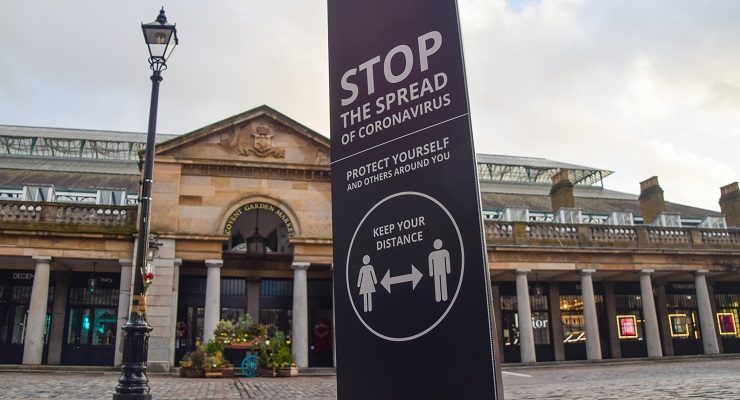
A highly infectious strain of COVID-19 is spreading through the UK causing officials to delay the country’s reopening. But how infectious is the strain, really?
The World Health Organization puts variants of COVID-19 into two categories: variants of interest, which show the virus has mutations that have caused COVID clusters around the world, and variants of concern, which are more transmissible, more severe, or vaccines or other medications are less effective.
While most variants have been detected in hotel quarantine, only two of the four variants of concern have led to community transmission in Australia: Alpha and Delta.
But state government officials have been quick to ramp up the hyperbole on their severity — even if there’s no evidence to support their claims.
South Australian officials were castigated in August for exaggerating concerns around the strain that caused a six-day lockdown, calling it “sneaky” with a shorter incubation period. But experts said the new strain didn’t actually exist — it was a slight mutation with no different effects from the dominant strain circulating in Australia for months.
Here is a quick guide to variants and their impact on Australia:
Alpha (B.1.1.7)
First emerged in the UK in mid-September 2020 but by December was responsible for two-thirds of COVID cases in London.
Cases in Australia The strain spread from a returned traveller in hotel quarantine in Brisbane in January and the city went into a three-day lockdown. Australia reduced caps on international arrivals by 50% for a month. The same strain caused another three-day Brisbane lockdown in late March.
It caused Western Australia’s seven-day January lockdown, its three-day April lockdown, and Melbourne’s third lockdown in February.
Rhetoric “[This is] a more rapidly spreading variant of the virus … causing havoc throughout England,” WA Premier Mark McGowan said.
Queensland Premier Annastacia Palaszczuk said: “This virus is actually circulating in the corridors [in hotel quarantine] so it’s a wake-up call.”
In February Victorian Premier Dan Andrews said: “This is a new hyper-infectious strain, moving at hyper-speed. It shows just how incredibly infectious this virus is. And our public health team tell us it’s only getting faster.”
Risk This is a variant of concern. It’s “substantially more infectious” than other variants — with 50% increased transmission and there’s evidence it has increased risk of death compared with previous strains.
Kappa (B.1.617.1)
First emerged in India in October.
Cases in Australia This strain is responsible for most of the active cases in Victoria which sent Melbourne into its recent 14-day lockdown. It emerged from a returned traveller in quarantine in South Australia.
Rhetoric Victoria’s chief health officer Professor Brett Sutton called the strain a “beast” — although later walked that back after criticism from experts who said he was overplaying the severity of the outbreak.
“So when I use the term beast … I’m trying to warn against complacency and motivate everyone to get tested to isolate, to follow the rules,” he said.
“It is a more concerning, more contagious variant. It doesn’t do magical things, but it is fair to say we are seeing transmission through those fleeting exchanges and maybe where infectious cases left the space and another person has moved into it.”
Other experts have also criticised the use of “fleeting”.
Risk The strain is a variant of interest, although the WHO hasn’t found an increase in transmissibility or disease severity.
Delta (B.1.617.2)
First emerged in India in October.
Cases in Australia Last week health authorities found it in Victoria in two people who travelled to popular tourist destinations in New South Wales.
Rhetoric The Victorian government shot itself in the foot by falsely promoting the severity of the Kappa strain during its lockdown. The Delta strain seems to be more infectious, but commentary around it was much more subdued.
Sutton said: “It is a variant of significant concern … It does appear to be the most significant [variant] in terms of transmissibility.”
Risk Delta has been classified as a variant of concern by the WHO. Doherty Institute director Sharon Lewin estimated it is about 50% more infectious than Alpha and has 2.6 times the risk of hospitalisation within 14 days compared with Alpha.
Other strains of concern
Beta (B.1.351) first emerged in South Africa in May 2020, and Gamma (P.1) emerged in Brazil in November.
Transmissibility and vaccines
UNSW Kirby Institute associate professor Stuart Turville tells Crikey it’s important to let the dust settle before making claims about transmissibility and severity.
“As you move forward you get better data sets as those [data] variations become smaller and smaller, and you get greater confidence in terms of what that variant is up to,” he said.
Transmissibility is determined either through lab studies — which examine viral load and how easily the virus spreads — or by looking at how many people one person infects. Both don’t take into account social and environmental factors, such as whether people were huddling together indoors.
So far it seems vaccines don’t work as effectively on the Beta variant, but Turville stressed this is only tested on people who become symptomatic. The vaccines are still effective at reducing the chances of developing severe cases of COVID and preventing death.
“The short answer is there’s no variant that we know of that goes beyond what we see with the Beta variant,” he said.








I’m waiting for the Holycrap Variant.
Note that Kappa was included with Delta as a Variant Of Concern at the start of May, but downgraded to a Variant Of Interest by WHO at the start of June. Kappa is widely believed to have similar transmissibility properties to Alpha, and potentially slightly more so based om the Secondary Attack Rate published in UK Technical Briefing in May, although there was not enough data to have confidence on this.